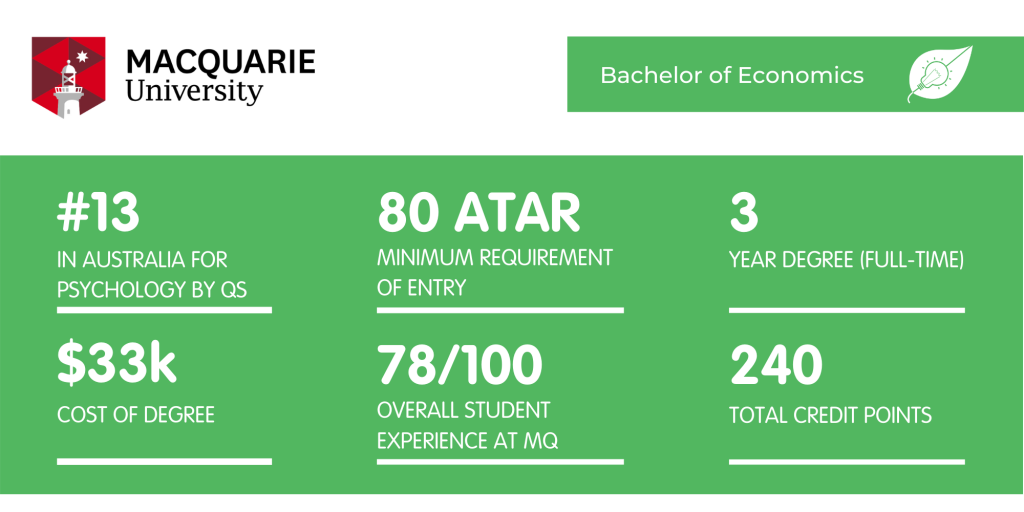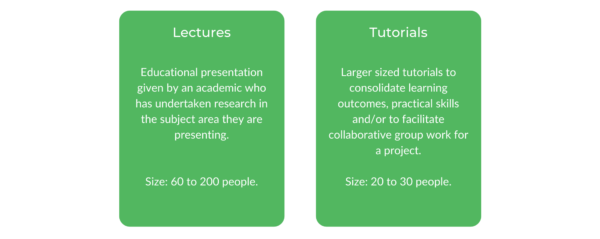So you’re thinking a Bachelor of Economics at MQ Uni could be for you?
Let me guess, you have an excel spreadsheet filled with all of your options for uni like the good statistician you are. Well, luckily for you, we have all the data (aka information about the degree) that you need right here—Major options, class formats, faculty culture and much more.
One thing though—you’ll need to scroll down to find what you’re looking for!
What is a Bachelor of Economics at MQ Uni?
Core Units and Majors
How to Get into a Bachelor of Economics at MQ Uni
What’s the Teaching Format?
What’s the Faculty and Culture Like?
What is a Bachelor of Economics at MQ Uni?
Macquarie University is your go-to for everything Economics. It’s a comprehensive program that meets Australia’s graduate expectations for economists—but it’s also so much more than just micro, macro and econometrics.
Macquarie crafted this program with a trained understanding of the importance of both public and private economic affairs. Undertaking your Bachelors here will give you the tools, both hard and soft, to interact with and mould the outcomes of these economic events.
In given time, you’ll know the economic policies of international governments like the back of your hand. You’ll be that person at the party that won’t shut up about the implications of the latest Australian budget and you’ll see market prices as more than just a given, but a result of multiple domestic and international influencers.
Most importantly, you’ll have access to an ever-growing and increasingly broad job market that has a need for people like you! Which brings us to the next point:
Where could this degree take you?
Graduates of the Bachelor of Economics at MQ end up in a range of organisations, both private and public, upon completion of the program. The skills of an economist are needed in businesses of all shapes and sizes.
You could end up working with large commercial banks, or very easily for companies on the other end of the spectrum, like NGOs. Here’s a few of the professions that you could pursue through these companies:
-
- Econometrician
- Economist
- Financial analyst
- Investment analyst
- Market analyst
- Planning/policy analyst
- Consultant
In saying that, people from this degree could also end up in communications roles or even non-economic-related government positions. This is because the problem-solving skills that Macquarie University Economics students gain are also highly sought after.
Core Units and Majors
You will find that a Bachelor of Economics is much more regimented than a Bachelor of Commerce at Macquarie. This is because Macquarie University Economics is a specialised Bachelor degree, with a pure focus on Economics.
What are the Core Units?
The core zone itself consists of 240 credit points (each subject is 10 credit points). Don’t freak out too much though—50 of these credit points are economics electives, which still leaves you some room for exploration!
Here’s a few of the compulsory core courses you’ll need to complete:
-
- Microeconomics Analysis and Applications
- Macroeconomics Analysis and Applications
- Business Statistics
- Econometric Principles
These compulsory core courses are designed to have you job ready for a career as an economist. Though there isn’t official accreditation for becoming an economist, there are academic expectations that are met through the completion of these compulsory units.
There are also those core elective units, which means you’ll have the option to dive deeper into your fave area of Economics. You’ll still need to choose them from an approved list though, so it’s not a complete free for all!
Here’s a few of the subjects that you can choose from:
-
- Health Economics
- Econometric Methods
- The Asian Economies
- Money and Finance
- Behavioural Economics
For a full list of the core units, check out the course handbook!
What about Majors?
Because a Bachelor of Economics at MQ is a specialised program, you can essentially think of your major as Economics. One cool thing about the program, though, is the flexible zone—it consists of 80 credit points to do with what you please.
With the flexible zone, if you qualify for a subject (even non-commerce subjects) you can enrol in it. This means you have enough spare credits to build up a minor in whatever subject you want!
Is there a built-in internship?
One of the greatest things about studying at Macquarie is PACE (Professional and Community Engagement)—an award-winning program that gives students practical experience, reflected by Macquarie’s commitment to employability for its students. PACE is included in every Bachelor degree at Macquarie, and there is the option to take even more PACE units as part of your flexible zone.
The compulsory PACE unit will most likely have you working with a host organisation, while being guided by your unit convenor. PACE blends practical skills with guided learning.
Essentially, you will be introduced to a project by an industry partner and then you will spend the semester working on the project. Then, at the end of the semester, you’ll present it to the industry partner.
You can also use the PACE units in your flexible zone to undertake a semester-long internship and gain credits while you do it (sounds like a win-win to me!). The program could have you working with host organisations in government, industry and NGO areas, and it could even take you overseas!
For more information about PACE click here!
How to Get into a Bachelor of Economics at MQ Uni
In order to be guaranteed entry into Macquarie University Economics, you’ll need an ATAR of at least 80. That being said, Macquarie understands that everyone has different backgrounds and skill sets to offer and so they have alternative pathways for entry.
Using Macquarie’s Entry Navigator you can figure out which type of entry suits you best!
Are there any pre-requisite subjects or assumed knowledge?
A Bachelor of Economics at MQ does not require any prerequisite HSC subjects. However, this is economics we’re talking about.
So, HSC Mathematics Advanced or equivalent is assumed knowledge. If you haven’t done this, we recommend you take a Maths elective in your first year!
How about scholarships?
Macquarie offers a range of different scholarships for every faculty and year of study. Check out their grants and scholarship information to figure out which one is the right fit for you!
What’s the Teaching Format?
Unlike studying a Bachelor of Commerce at UNSW, you’ll be blessed with a semester system for Macquarie University Economics. This means you’ll have two teaching sessions per year and each session is built of four courses under a full-time load.
Class Structure
During your first and second year, your classes will be built of lectures and tutorials. The lectures will go for 2 hours and the tutorials will go for 1.
Once you progress into the third year, your hours might go up a little with lectures going for 3 hours and tutorials going for 2. This means you’ll have somewhere between 12-20 hours of classes per week.
Lectures
Lectures are almost never compulsory. These sessions are designed to introduce the content—they’re essentially a big 2 hour long presentation where the lecturer will go over all of the content that will inform your assignments and exams.
In your first years you’ll find lecture theatres to be jam-packed with 100 to 200 people, because all of the Commerce kids (plus people taking electives) will also be taking the same class. Once you progress, theatres will probably only have 60 other students.
One cool thing about lectures at Macquarie University Economics is that the lecturers will actively try to make the classes more interactive and entertaining. Some lecturers might create activities where you can earn ‘virtual currency’ to buy grades.
Other lecturers might teach you economics theories through Disney songs. One thing’s for certain, you won’t be bored, and you’ll be keen to show up even though they aren’t compulsory!
Tutorials
Tutorials are reserved for going over the lectures more intimately. This is where you’ll be doing lots of case studies, work examples and group work—these activities are essentially just an extension of the lecture but they are more interactive and you’ll have plenty of time to ask questions.
Tutorials are much smaller than lectures. They have a distinct high school classroom vibe with only 20 to 30 other students present.
Assessments
Sorry to break it to those of you who aren’t big fans of exams because you’ll definitely be getting a lot of them. Pretty much every subject will have a final exam that will test you on all of the content from the semester.
Throughout the semester you will have some small quizzes, assignments and progress reports. The general assessment schedule is:
-
- Assignment 1
- Mid semester exam
- Assignment 2
- Final exam
Of course there will be some differences in each course, but this is typically what you can expect.
As far as assignments go, you’ll probably be looking at take-home exams, case studies, theory-based essays or group presentations.
Skills You Develop
Studying Macquarie University Economics will deck you out with some serious skills, both hard and soft!
Firstly, you’ll be the master of stats—you’ll be able to read an excel spreadsheet easier than an English major can read Dickens. You’ll also be able to apply economic theories to real-world situations based on all of the case studies you’ll be going through.
On top of these hard skills, you’ll also gain some useful soft skills. These will be established in all of the group work assignments you’ll be doing. You’ll learn to be a master communicator and you’ll know how to deliver an A+ presentation.
What’s the Faculty and Culture Like?
One of the biggest selling points for Macquarie is the amazing culture and access to multiple support networks. The Macquarie Business School is super supportive, providing lots of student services in the form of mentoring, networking and awesome social events too!
The cohort itself is really tight-knit as a result of its small size. Everyone gets to know each other eventually through group work and events—in other words, you won’t have any trouble meeting some amazing people and finding some new mates straight away.
Mentoring
Firstly, Macquarie offers general mentoring services to first year students (check out Macquarie University Mentors!) where they are guided by someone from the years above. But the Business School goes so much further than that.
The Faculty offers tailored mentoring where students are paired up specifically with other students in Economics.
It also offers LUCY Mentoring where penultimate students are given the opportunity to get mentorship from industry partners. The industry partner will help them write resumes as well as give advice with how to find jobs and act during interviews.
There’s also the option of peer-assisted learning, where students will be taught by second or third years with High Distinction averages. It’s essentially a guided study group, which is an amazing resource academically and socially.
Overall, if you’re tossing up over which uni to choose, you’ll find that Macquarie’s student resources are the best in the game. So what are you waiting for? Start your UAC application now!
Interested in the pros and cons of this degree? Check out our article here!
Cody Williams is a Content Writer at Art of Smart Education. While Cody studied a Bachelor of Arts in International Relations and French Studies at UNSW, he quickly realised that his dream job would have him sit happily behind a keyboard. Cody’s digital writing career started with an internship at Bauer Media where he was writing for ELLE and Harper’s BAZAAR’s online publications. Once he had a taste for writing he never looked back, moving to Brisbane soon later to work as a Producer for Channel Nine Queensland. After a year in television media, he dusted off his online writing shoes so he could put them to good use, stamping out some scorching-hot career and educational resources at AOS.






